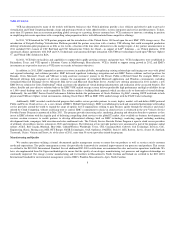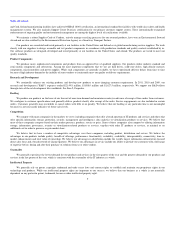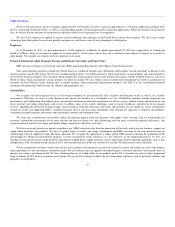EMC 2011 Annual Report Download - page 19
Download and view the complete annual report
Please find page 19 of the 2011 EMC annual report below. You can navigate through the pages in the report by either clicking on the pages listed below, or by using the keyword search tool below to find specific information within the annual report.
Table of Contents
upgrade, could cause substantial business interruption that could adversely impact our operating results. We are investing significant financial and personnel
resources into this project. However, there is no assurance that the design will meet our current and future business needs or that it will operate as designed.
We are heavily dependent on such computer systems, and any significant failure or delay in the system upgrade, if encountered, could cause a substantial
interruption to our business and additional expense which could result in an adverse impact on our operating results, cash flows and financial condition.
We may have exposure to additional income tax liabilities.
As a multinational corporation, we are subject to income taxes in both the United States and various foreign jurisdictions. Our domestic and
international tax liabilities are subject to the allocation of revenues and expenses in different jurisdictions and the timing of recognizing revenues and
expenses. Additionally, the amount of income taxes paid is subject to our interpretation of applicable tax laws in the jurisdictions in which we file and changes
to tax laws. From time to time, we are subject to income tax audits. While we believe we have complied with all applicable income tax laws, there can be no
assurance that a governing tax authority will not have a different interpretation of the law and assess us with additional taxes. Should we be assessed with
additional taxes, there could be a material adverse effect on our results of operations or financial condition.
In February 2010, President Obama, as part of the Administration's FY 2011 budget, proposed changing certain of the U.S. tax rules for U.S.
corporations doing business outside the United States. The proposed changes include limiting the ability of U.S. corporations to deduct certain expenses
attributable to offshore earnings, modifying the foreign tax credit rules and taxing currently certain transfers of intangibles offshore. In August 2010, President
Obama signed into law H.R. 1586 (commonly known as the Education Jobs and Medicaid Assistance Act), which included several international tax
provisions with minimal impact on the Company's effective tax rate. As part of its FY 2012 budget, the Administration has re-proposed, with certain
modifications, a number of tax provisions that were not adopted during the previous Congress. Although the scope of future changes remains unclear,
revisions to the taxation of international income continue to be a topic of conversation for the Obama Administration and the U.S. Congress. As the enactment
of some or all of these proposals could increase the Company's effective tax rate and adversely affect our profitability, we will continue to monitor them.
During 2010, the IRS announced and finalized Schedule UTP, Uncertain Tax Positions Statement. This schedule is an annual disclosure of certain
federal UTPs, ranked in order of magnitude. According to the IRS, the disclosure is to include "a concise description of the tax position, including a
description of the relevant facts affecting the tax treatment of the position and information that reasonably can be expected to apprise the Service of the
identity of the tax position." As a result of this disclosure, the amount of taxes we would have to pay in the future could increase.
In December 2010, the President signed into law H.R. 4853, Tax Relief, Unemployment Insurance Reauthorization, and Job Creation Act of 2010,
which included an extension of a number of expired tax provisions retroactively to 2010 and prospectively through 2011. Among the extended tax provisions
was the research and development tax credit, which provides a significant reduction in our effective tax rate. The renewal of this credit beyond 2011 is
uncertain.
Changes in regulations could materially adversely affect us.
Our business, results of operations or financial condition could be materially adversely affected if laws, regulations or standards relating to us or our
products are newly implemented or changed. In addition, our compliance with existing regulations may have a material adverse impact on us. Under
applicable federal securities laws, including the Sarbanes-Oxley Act of 2002, we are required to evaluate and determine the effectiveness of our internal
control structure and procedures for financial reporting. Should we or our independent auditors determine that we have material weaknesses in our internal
controls, our results of operations or financial condition may be materially adversely affected or our stock price may decline. In March 2010, President Obama
signed into law a comprehensive health care reform package. We cannot currently determine the impact that such legislation could have on our business,
results of operations or financial condition.
Changes in generally accepted accounting principles may materially adversely affect us.
From time to time, the Financial Accounting Standards Board ("FASB") promulgates new accounting principles that could have a material adverse
impact on our results of operations or financial condition. The FASB is currently contemplating a number of new accounting pronouncements which, if
approved, could materially change our reported results. Such changes could have a material adverse impact on our results of operations and financial position.
18
























